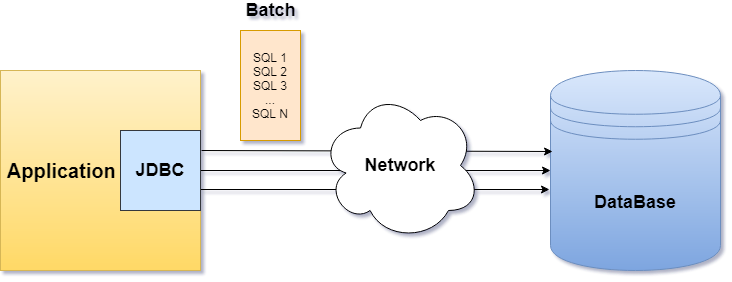salut!
Dans cet article, je parlerai brièvement du traitement par lots des instructions SQL (DML): INSERT, UPDATE, DELETE, comme l'un des moyens d'obtenir des performances accrues.

Avantages
Contrairement à l'exécution séquentielle de chaque requête SQL, le traitement par lots permet d'envoyer un ensemble complet de requêtes (paquet) en un seul appel, réduisant ainsi le nombre de connexions réseau requises et permettant à la base de données d'exécuter un certain nombre de requêtes en parallèle, ce qui peut augmenter considérablement la vitesse d'exécution. Faites immédiatement une réservation afin de constater un effet notable lors de l'insertion, de la mise à jour ou de la suppression de grandes quantités de données dans une table de base de données.
Table DB
Par exemple, nous utiliserons la table du livre avec les champs id et title.
1. JDBC - traitement par lots
Avant de passer aux exemples d'implémentation, il est nécessaire de souligner plusieurs points importants:
- JDBC , supportsBatchUpdates() DatabaseMetaData, , . true, .
- , setAutoCommit(false). , commit() rollback(). rollback() SQL .
- — , JDBC Statement, PreparedStatement CallableStatement, .
, Statement, PreparedStatement CallableStatement . , BATCH_SIZE. , . , , Hibernate 10 50.
, SQL INSERT. UPDATE, DELETE .
1.1. Statement
Statement book.
connection.setAutoCommit(false);
try (Statement stmt = connection.createStatement()) {
for (int i = 1; i <= SIZE; i++) {
stmt.addBatch("INSERT INTO book (title) VALUES ('" + "JDBC Insert Example: " + i + "')");
if (i % BATCH_SIZE == 0 || i == SIZE) {
try {
int[] result = stmt.executeBatch();
connection.commit();
} catch (BatchUpdateException ex) {
Log(ex);
connection.rollback();
}
}
}
}
:- C Statement;
- C void addBatch( String SQL );
- executeBatch(). executeBatch() .
Statement SQL INSERT, UPDATE, DELETE.
SQL , .
1.2. PreparedStatement
PreparedStatement book.
connection.setAutoCommit(false);
try (PreparedStatement pstmt = connection.prepareStatement("INSERT INTO book (title) VALUES (?)")) {
for (int i = 1; i <= SIZE; i++) {
pstmt.setString(1, "JDBC Insert Example: " + i);
pstmt.addBatch();
if (i % BATCH_SIZE == 0 || i == SIZE) {
try {
int[] result = pstmt.executeBatch();
connection.commit();
} catch (BatchUpdateException ex) {
Log(ex);
connection.rollback();
}
}
}
}
:- C PreparedStatement SQL ;
- , ;
- void addBatch();
- executeBatch().
3) 4) , Statement, — addBatch() .
SQL , , . , .
PreparedStatement SQL (INSERT, UPDATE, DELETE) Statement, - .
1.3. CallableStatement
CallableStatement .
, OUT INOUT.
CallableStatement book.
connection.setAutoCommit(false);
try (CallableStatement cstmt = connection.prepareCall("call insert_book(?)")) {
for (int i = 1; i <= SIZE; i++) {
cstmt.setString(1, "JDBC Insert Example: " + i);
cstmt.addBatch();
if (i % BATCH_SIZE == 0 || i == SIZE) {
try {
int[] result = cstmt.executeBatch();
connection.commit();
} catch (BatchUpdateException ex) {
Log(ex);
connection.rollback();
}
}
}
}
:- C CallableStatement ;
- , ;
- void addBatch();
- executeBatch().
, PreparedStatement.
, , .
- , .
CallableStatement , - .
1.4. BatchUpdateException
BatchUpdateException, . BatchUpdateException , SQL , - , ResultSet. BatchUpdateException ( getUpdateCounts()), , executeBatch. , SQL . , c (Statement.EXECUTE_FAILED) .
:
...
} catch (BatchUpdateException ex) {
int[] updateCount = ex.getUpdateCounts();
int count = 1;
for (int i : updateCount) {
if (i == Statement.EXECUTE_FAILED) {
System.out.println("Request " + count + ": Execute failed");
} else {
System.out.println("Request " + count + ": OK");
}
count++;
}
}
...
. , , , , . BatchUpdateException SQL , . .
2. Hibernate —
2.1.
, , hibernate.jdbc.batch_size Hibernate.cfg.xml . Hibernate SQL INSERT, UPDATE, DELETE JDBC . SQL JDBC hibernate.order_inserts, hibernate.order_updates true, Hibernate SQL . SQL , JDBC Hibernate addBatch() PreparedStatement, SQL .
Hibernate.cfg.xml
...
<property name="hibernate.jdbc.batch_size">50</property>
<property name="hibernate.order_inserts">true</property>
<property name="hibernate.order_updates">true</property>
...
2.2.
. , . , Hibernate , OutOfMemoryException. 2 :
- flush() clear() .
:
try (Session session = HibernateUtil.getSessionFactory().getCurrentSession()) {
Transaction transaction = session.getTransaction();
transaction.begin();
for (int i = 1; i <= SIZE; i++) {
session.persist(new Book("Hibernate Insert Example: " + i));
if (i % BATCH_SIZE == 0) {
session.flush();
session.clear();
}
}
transaction.commit();
}
- StatelessSession. StatelessSession . , , , (aliasing) . , Hibernate. Hibernate.
:
try (StatelessSession session = HibernateUtil.getSessionFactory().openStatelessSession()) {
Transaction transaction = session.getTransaction();
transaction.begin();
for (int i = 1; i <= SIZE; i++) {
session.persist(new Book("Hibernate Insert Example: " + i));
}
transaction.commit();
}
L'exécution par lots de requêtes SQL est l'un des moyens bien connus d'améliorer les performances auquel vous devez prêter attention. Réduire le nombre de connexions réseau à la base de données et augmenter la vitesse d'exécution des requêtes est un avantage significatif en faveur de l'utilisation du traitement par lots.
Des exemples de code peuvent être trouvés sur GitHub .